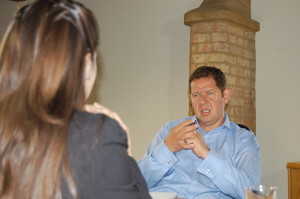The 4 Reasons you should Take Time on your Exit Interviews

One of the things that constantly amazes me is how we let staff leave our company without spending quality time finding out exactly why they are leaving
The exit interview is worth spending quality time on planning, doing and reviewing the results.
Here’s why:
1. The exit interview will give you valuable management information
When people leave the organisation, you need to treat the exit interview as a vital form of evidence gathering.
It is not a form filling exercise that “has to be completed as quickly as possible” and you should not make any assumptions as to why people are leaving.
People may have a number of smaller reasons to back up their main reason for leaving. Your job is to:
- Use effective questioning so that you can
- obtain evidence as to why the person left
There are a variety of reasons why we leave an organisation:
- Money
- Conditions
- The job is boring
- The job is too demanding
- The job is not me
- I have conflict at work (Boss/colleagues/Directors/Customers/Suppliers, etc.)
- Personal development opportunities are minimal
- The job I am leaving for is more challenging
- The organisation I am leaving for is an employer of note.
This list is by no means exhaustive and in no particular order.
Think of the decisions that can be made at a strategic and operational level as a result of uncovering quality information in an exit interview. I once discovered bullying was taking place because I showed real interest in why someone was leaving and did not pay lip service to her answer that “I just stopped enjoying working here.”
2. If your values state that you care about people, show it!
I once worked for a small company for 4½ years and on my last day I had a leaving party and flowers. My Boss told everyone why I was leaving in his big speech.
“Kay’s leaving us as she’s come to the end of her time here, Kay can’t learn any more here.”
– and yet that was not the major reason at all!
He had not taken the time and care to find out why I was really leaving. My reason was that my relationship with him had run into problems and he didn’t appear to want to fix it. Communications between us had changed from positive and free to strained and problematic.
If he had found out what the problem was he could have worked at it and I might have stayed.
My colleagues were disappointed in him, as they thought his big words to us
“YOU are the company!”
really meant something, yet his actions with me showed the reverse.
He was shocked the hear people say “Oh no she isn’t!” when he made his speech and as it dissolved into a pantomime scene he realised he had lost his credibility as a manager and Director.
Everyone in that team had left come the following year.

3. If a customer leaves you, do you take the time to find out why?
One survey* revealed why companies lose customers:
A massive 68% drift away because of the indifferent attitude of employees
This is a shocking statistic however:
How many of your staff drift away due to the indifferent attitudes of managers?
Remember – if they choose to see it that way, then that’s their reality.
Ensure you KNOW why your people are leaving!
4. It is good PR to do a good exit interview
Most organisations invest an enormous amount in branding and image. Don’t waste the exit interview as a valuable PR opportunity.
You want your person to leave waxing lyrical about your company to their friends, acquaintances and next employer.
Plus, if things don’t work out for them at their next company, ensure you’ve both left doors open by speaking to each other in a caring way.
The format of the exit interview
Before the exit interview:
Plan your questions (see examples below).
Ignore what the grapevine may be telling you and plan in quality time to spend talking to this person, discovering what their experience has been of the organisation and finding out why they are leaving.
Plan in plenty of preparation, interview and evaluation time.
It is best practice for the exit interview to be one to one so that both parties can relax.
Have a format just as if it were an appraisal or recruitment interview. Thank them for their time, state the purpose – spend some time discovering their unique experience of the job/organisation and find out where they are going.
During:
Begin with the future and draw them back to their job.
Start by showing lots of interest in their new job. Easy questions are:
So you’re moving to {ABC company}. What is the job you are moving to?
Build on what they say such as:
When you say you’ll have more responsibility, can you give me an example?
(then ask)
Did you find you had that type of opportunity here?
Once you’ve exhausted their future and got them chatting about their new opportunity, move to finding out in more detail why they are leaving you.
Ask them :
What is the best thing about working with us?
Can you think of the most rewarding project you’ve had since you’ve been with us?
Is there one thing you’ll miss about working with us?
What’s the one piece of advice you would give the new person?
Would you change the job in any way to help a new person?
If you had stayed with us, what would have made it your dream job?
What is the one drawback of working with us?
What is the one drawback of the job?
What has been the best thing about working for us?
If you could describe {us/the organization}, what would you say?
Can you build upon that for me?
Some other behavioural questions you may want to ask about any areas of why they are leaving are:
Training for the Job:
Describe the training you received to do your job. (Knowledge, skills, attitudinal).
How relevant was the training method to you being able to learn/do your
job/ apply back in the workplace? Was the training worthwhile? Why/Why not?
Was the training evaluated? By whom? How?
Best use of your skills:
Describe your knowledge and skills.
Did we maximise these during your time with us?
If not, where did we let you down?
Opportunities for development:
Were any of your training needs not met by us? If not, describe why not. Who refused you? What reasons were given?
What personal development has {the organizat
ion} given to you? (Courses/secondment/job opportunities?).
Opportunities to participate:
Describe the projects and tasks that you had a lot of input to.
Describe any opportunities where you felt you could have participated but didn’t. Why was that?
Promotion and career prospects:
Describe how your career has progressed since you have been with us.
Are you leaving for career progression? (If yes… did you investigate your chances within our organisation?).
Rules and Regulations:
What has been the worst rule when working for us?
Do you think any of the rules and regulations have got in the way of you doing the job the way you want to? If so, describe one rule/regulation and what you mean.
Salary progression/Company benefits:
Are you leaving for more money? (If yes… can you divulge the package you will be getting from your next company so that I can compare it to ours?)
Working environment
Describe the best thing about the working environment here
Describe the worst thing about the working environment here
Overtime and bonuses:
What bonus opportunities have you enjoyed here? Did you attain them? Were they realistic? Were they appropriate for the work involved?
What overtime have you done with us? Has this caused you any problems?
Attitude of other staff/managers:
Have you found any of your colleagues/your manager difficult to get on with/get information from/ unhelpful?
Can you describe what they did?/ said/ you did/said?
Have you found any of your colleagues/your manager very helpful towards you achieving your working targets?
Can you be specific – what did they do?
Support:
Can you describe the support you have had from {the organisation} since you have worked for us?
Can you name people/departments? What did they do?
Has any person/department not delivered the support you were looking for/needed?
Can you name people/departments? What reasons did they give?
Hours of work:
Have you had any difficulties doing your job with the hours of work we have?
Describe what you mean to me.
Flexibility of the organisation:
Describe how {the organisation} has encouraged you into different tasks/projects since you have been here.
Have you found any person/department unwilling to change since you have been here?
Can you name people/departments? What did they do?
My conclusion?
If a Managers role is to plan-do-review, then spending time on the information gathered from the exit interview will be an enriching experience for both parties and it will provide essential information to help Plan-Do-Review.
I spoke with a client recently who said that if only her Manager had shown interest in her responses, she would have stayed in her job. Her gain ultimately and their loss, as she is now Director of a go-ahead company.
It may be your chance to keep them
Happy exit interviews.








.jpg)